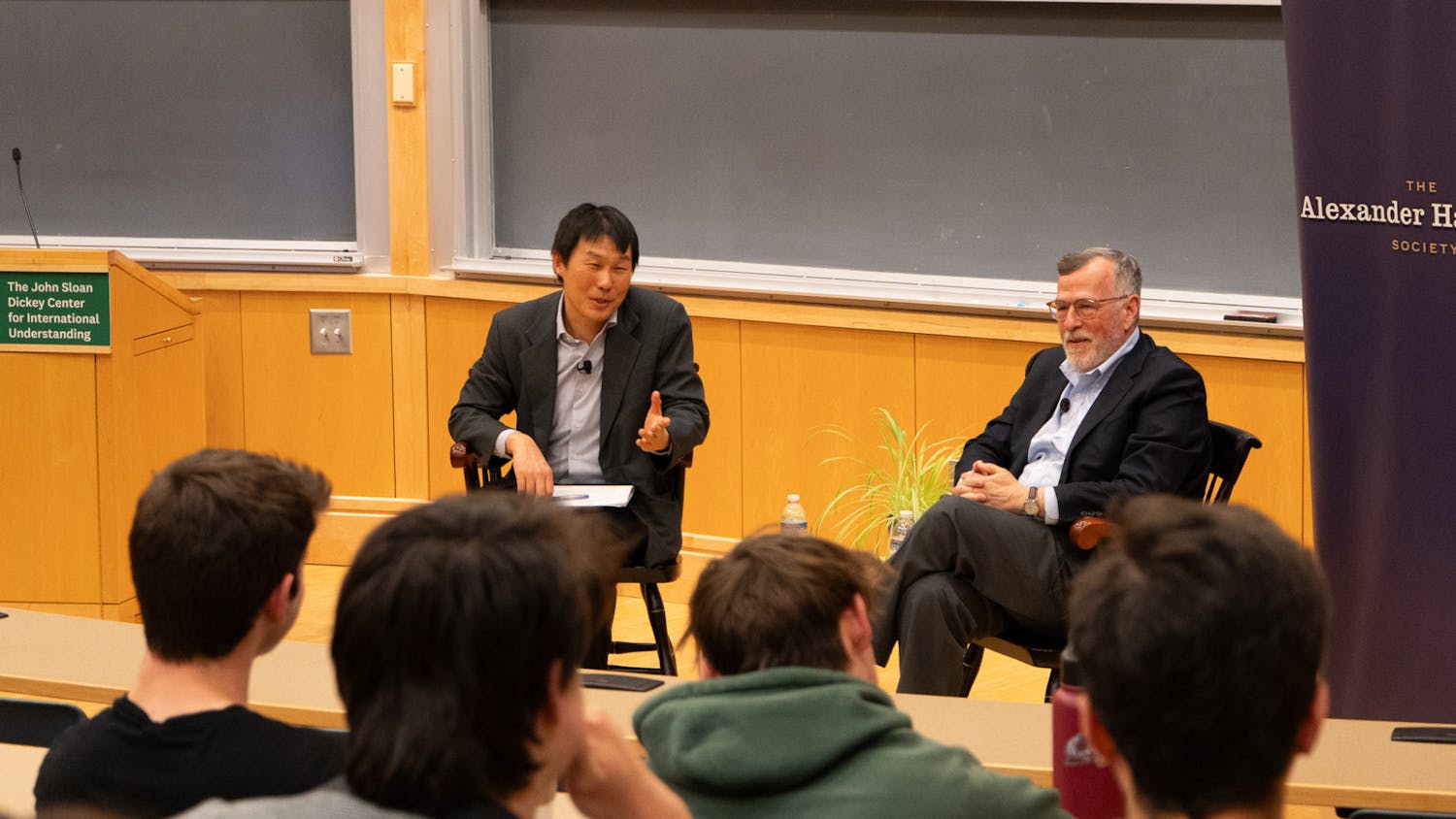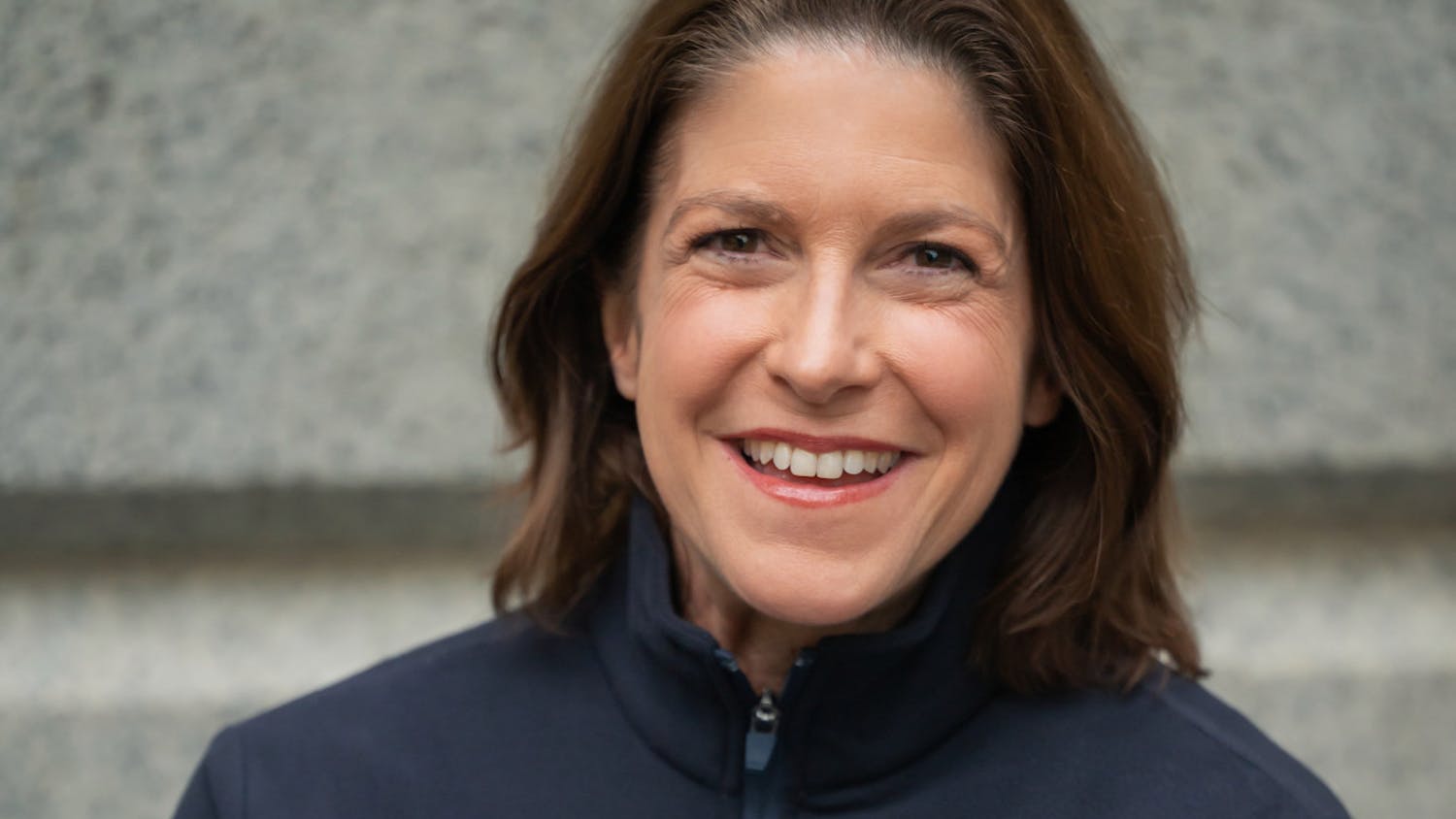This article is featured in the 2024 Freshman special issue.
On Oct. 28, 2023, Kevin Engel ’27 woke up to nearly 600 text messages — responses to an email sent from College President Sian Leah Beilock to Dartmouth students, parents and alumni. In her message, Beilock informed the Dartmouth community that two student protesters — who were identified by The Dartmouth as Engel and fellow pro-Palestinian activist Roan Wade ’25 — had been arrested the night before for making a “threat of violence” against the College. The two had been encamped on the front lawn of Parkhurst Hall to protest for “divesting the College’s endowment from all organizations that are complicit in apartheid and its apparatuses,” among other aims outlined in the Dartmouth New Deal.
Publicly, Engel and Wade’s arrests — and Beilock’s email — stirred controversy on campus. Some student groups, including Sunrise Dartmouth — a climate advocacy group in which both Engel and Wade hold leadership positions — convened a “Student March for Freedom” on Oct. 30 in support of the pair. The Dartmouth Review, a conservative student newspaper, published a piece titled “Bravo, President Beilock: Hanover Police Arrest Two Student Protesters” to “applaud the Administration’s response” to Engel and Wade’s encampment.
Engel and Wade are among thousands of people this year who have been arrested for participating in pro-Palestinian protests on college campuses nationwide. For some of those protesters, their activism has made them a “limited-purpose” or “vortex” public figure — someone who has “thrust themselves to the forefront of particular public controversies in order to influence the resolution of the issues involved” and “invite[d] attention and comment,” according to the Supreme Court decision in Gertz v. Robert Welch, Inc. In other words, activism has turned some student protesters into a subject-matter public figure instead of a private person, according to American University journalism professor John Watson.
“The [Supreme Court] has said a public figure is a person whose name is a household word,” Watson, who graduated from Rutgers School of Law, explained. “The determination … is very often dependent upon the medium that is accused of libel or slander.”
Who is considered a public figure can also depend on scale. For example, if a national newspaper defamed one of Dartmouth’s student athletes, that player would likely be considered a private person, not a public figure, according to Watson. He explained that “in the household that the courts would consider in connection with a national newspaper,” the name of the player would likely not be a household word. However, if a Dartmouth campus publication were to defame a College athlete, the player would be a public figure “in the household of [Dartmouth’s] small campus,” he said.
In contrast, the starting five on the Duke University men’s basketball team “would probably be” public figures even if they were defamed on a national platform because of the widespread popularity of the team, Watson said.
For Engel and Wade, Beilock’s email did more than spark debate on issues of campus safety and freedom of speech: It resulted in threats of violence and hate against the pair and outed Wade as non-binary to their family, Engel alleged.
“[Beilock’s email] exposed me and Roan to far-right news outlets who were writing pieces that were calling us terrorists, and the comments were filled with people calling us slurs,” he said. “[Wade’s] family then found out about their name change.”
Wade alleged at a Dartmouth Student Government Senate meeting in May that she received emails carbon copied to Beilock and her attorney that contained the words “mass shooting.”
When asked for comment about Engel’s claims, College spokesperson Jana Barnello deferred to Beilock’s Oct. 28 community message.
“Dartmouth deeply values and always defends the right of free speech, including the right to protest and demonstrate, in accordance with our established policies,” Beilock wrote in the message. “These policies have been developed to protect the rights of all members of our community to express their views while also protecting our academic mission and the safety of everyone on campus.”
Engel said he considered making a defamation claim toward the College because Beilock’s email “was not appropriate” but has not “felt like [he has] the resources to have a say in the matter.”
If he were to make a defamation claim, Engel may also face additional legal hurdles due to his involvement in campus protests. In court, a public figure has the burden of proving “actual malice” in order to win, whereas private people only have to show the defamatory statement “was made at least by mistake,” Watson said.
Students who have sued news publications that have shown their faces at pro-Palestinian demonstrations have “consistently” been ruled in courts as vortex public figures, Watson explained. As a result, their photographs can be used in the limited context of protest coverage. And being featured in public media can have significant consequences for some protesters. According to The New York Times, Davis Polk, a New York law firm, rescinded employment offers in October made to three Harvard University and Columbia University students who were affiliated with Palestinian solidarity groups.
In order to shield their members who do not wish to become public figures, activist groups have made media training “common practice” for years — ranging from groups that are student-led at Dartmouth to national organizations, according to Engel. The number of organizations that employ such tactics, however, has increased recently, Engel said. The Palestine Solidarity Coalition at Dartmouth, an organization of pro-Palestinian students and groups, “sometimes” will designate members as press liaisons for a protest or event, he explained. The organization has also brought in “someone who used to work in local media” to provide training to “effectively utilize the media to get your narrative across,” he added.
While trained activists often have access to institutional knowledge, such as open-source resource packets created by national organizations, to avoid unintentionally becoming a limited-purpose public figure, many newer members or non-activists do not. A member of the Class of 2025, who requested anonymity in order to speak candidly about his experience, said he was uncomfortable seeing his name published in association with the 89 people who were arrested on the Green during a pro-Palestinian protest on May 1. He explained that he had been arrested as a bystander without intent to protest.
“Continuing to speak out publicly only really anchors my name at the top of a Google search result page as a student who got arrested,” he said. “If [an arrested student is] looked up online by a future employer [or] by their peers, … [their] perception of them is out of their control.”
Although he did not want to continue to be publicly affiliated with the arrests, the student said he still believes it is important for people to understand the potential “consequence of a college that isn’t necessarily looking out for its students all the time.” The student said his arrest jeopardized his full-tuition scholarship, which he could have been obligated to pay back in full had he been convicted. Ultimately, the prosecutor decided not to pursue his charges.
“The large police response to what were peaceful protests — at least, they weren’t doing anything physically — put in danger students who weren’t there for that cause and kind of got broad-brushed into one large group by the administration after the fact,” he said.
Student protesters are not the only public figures or limited-purpose public figures on college campuses, Watson said. Others who may be considered public figures include members of elected student government associations and the editor-in-chief of a student publication.
Student body president Chukwuka Odigbo ’25 wrote in an email statement to The Dartmouth that advocating for students’ interests is his “primary concern” and is unchanged by the possibility of likely being a public figure.
“My advocacy as student body president remains student-centered and student-led,” he added. “In past interactions with the media as a senator and as a DSG committee chair, I’ve worked on sharing information that I knew to be accurate. That approach will not change.”
Correction Appended (Sept. 4, 11:18 a.m.): A previous version of this article implied that Engel and Wade had been identified by name in Beilock's community message on Oct. 28. In fact, Engel and Wade were not named in the statement. The article has been updated to clarify that Engel and Wade were identified based on reporting by The Dartmouth.
Annabelle Zhang '27 is a reporter and editor from New Jersey. In the classroom, she studies Geography and Government modified with Philosophy and Economics. She enjoys creating recipes, solving puzzles and listening to music.




